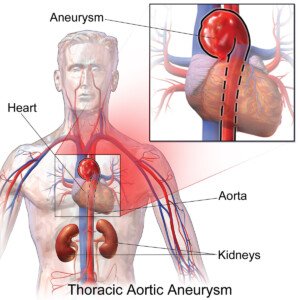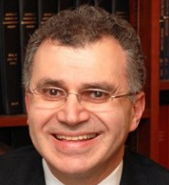
Two doctors explain the possible causes of a hoarse voice coupled with trouble swallowing
The first expert source for this article about the causes of the symptom duo of hoarse voice and swallowing difficulties is John A. Elefteriades, MD, William W.L. Glenn Professor of Surgery, and Director, Aortic Institute at Yale-New Haven, New Haven, CT.
You’re probably wondering why a consulting physician for hoarse voice and trouble swallowing would be an aorta specialist, being that the aorta is the largest blood vessel in the body, and arises out of the heart.
“An aortic aneurysm can, rarely, put pressure on the esophagus by virtue of its size,” explains Dr. Elefteriades, “and cause the symptom complex described.”
An aneurysm is a ballooned portion of a blood vessel. When a portion of the aorta is abnormally enlarged, this is an aneurysm.
Think of what a snake looks like after it just swallowed a big egg — the snake’s body is long and tube-like, and the egg inside bulges at some point along the snake’s body.

BruceBlaus/CreativeCommons
That’s kind of what an aneurysm looks like (but not always, as there are different kinds of aneurysms). But you get the picture.
Plus, if the aneurysm is located on the arch or descending portion of the aorta, it can cause compression of the nerve that controls the vocal cords, as this nerve passes along the aorta,” adds Dr. Elefteriades.
This disrupts signals to the vocal cords and will result in a hoarse voice.
If you have trouble swallowing, plus a hoarse voice, chances are that this is NOT from an aortic aneurysm.
Dr. Elefteriades says that these symptoms more commonly arise from “problems with the esophagus,” as well as “benign conditions, like reflux disease.”
Difficulty swallowing and a hoarse voice occurring together can also be caused by tumors, says Dr. Elefteriades.
What does an ear, nose and throat doctor have to say about causes of a hoarse voice?
Dr. Stacey Silvers, MD, of Madison ENT & Facial Plastic Surgery in NYC, who is board certified in otolaryngology, says that acid reflux is a common cause of hoarse voice.
But she also includes in the list the following: “Laryngitis, vocal cord polyps or nodules, long-term smoking irritates the vocal cords causing chronic swelling, vocal cancer.”
But what if trouble swallowing is tossed in?
“The most common cause of a choking sensation,” says Dr. Silvers, “is acid reflux, ‘silent reflux’ with our indigestion or heartburn symptoms,” when a foreign object in the throat has been ruled out.
Stomach acid comes up into the back of the throat, making it swell, says Dr. Silvers.
“This makes it hard to swallow. Patients may describe choking sensation or trouble swallowing.” A cough may also be present.
Believe it or not, stress can cause difficulty swallowing and a hoarse voice, because, as Dr. Silvers explains, stress can cause stomach acid to rise up into the back of the throat.
Trouble swallowing, though not necessarily with a hoarse voice, can also be caused by a hiatal hernia.
Both of these symptoms can also be a sign of esophageal cancer.

Formerly the chief of cardiothoracic surgery at Yale University and Yale New-Haven Hospital, Dr. Elefteriades is working on identifying the genetic mutations responsible for thoracic aortic aneurysms. He is the author of over 400 scientific publications on a wide range of cardiac and thoracic topics.












